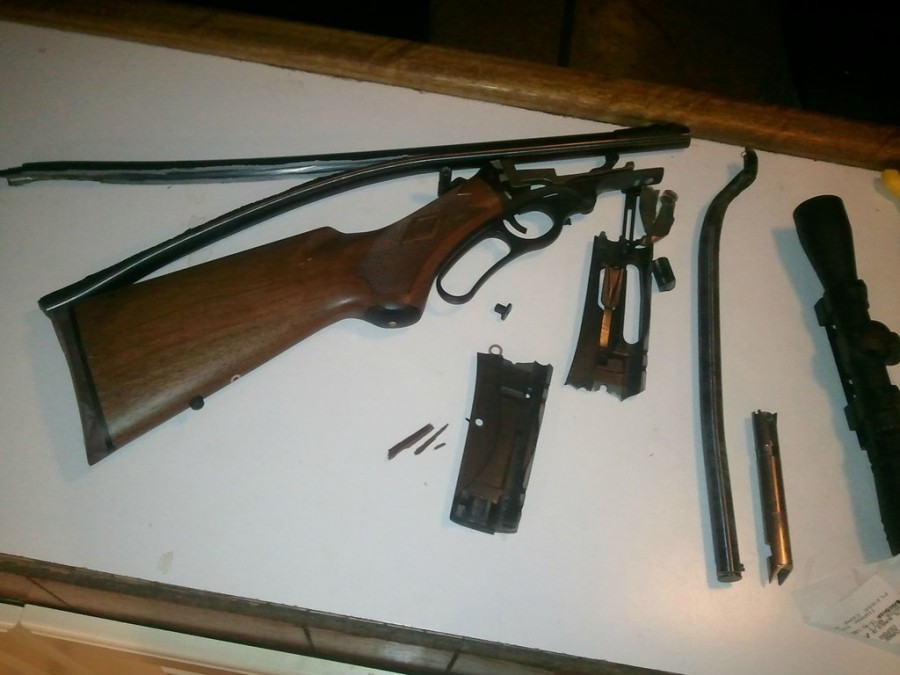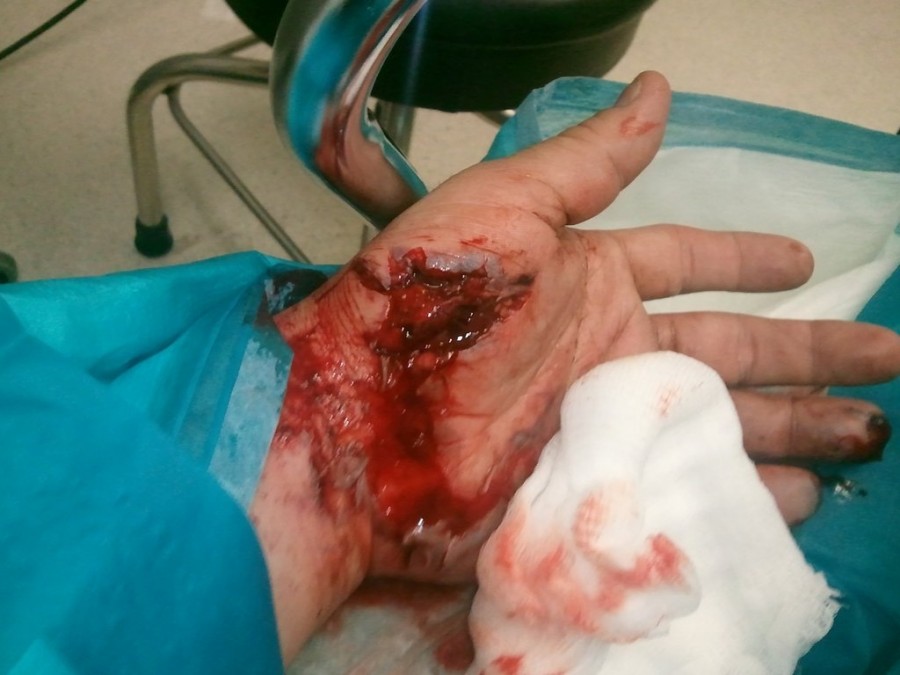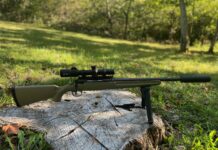There’s a story on Reddit this morning of an unfortunate shooting accident that landed one man in the hospital. After boresighting his Marlin lever action rifle in .444 Marlin, the first shot of the day through the rifle with one of his father’s handloads resulted in the barrel splitting apart like a peeled banana. What it did to his hand was ugly, but predictable . . .
It looks mostly superficial from what I can see — superficial in this case meaning non-life threatening and probably only cosmetic, yet still painful as all hell and definitely unpleasant.
The consensus seems to be that the boresighter they used left something in the barrel, and the obstruction cause the bullet to slow down and enough pressure to build to cause the barrel to rupture. The competing theory is that the father used pistol powder instead of rifle powder in his handloads and the pressure was too much for the gun to handle. Either way, this was a 100% preventable accident.
But his loss is our gain, as it’s a reminder that firearms require an extra level of caution to keep us safe. So remember kids:
- Always double check the barrel whenever you stick something down it like a boresighter
- Never use handloads that you did not load yourself
- Keep a first aid kit handy






Lucky he still has that thumb.
Ouch. A hand loaders nightmare. Stories like this remind me to stay alert while at my bench.
If that gun is an older Marlin made before Remington/Freedom Group eviscerated the old Marlin Company then it is a double Ka-Boom.
Ouch!
Hot hand load, barrel obstruction, or both?
Regardless, it’s still a valueable safety lesson. I’m glad that isn’t my Marlin. I shoot Buffalo Bore, which is pretty damn hot, but have not seen any pressure signs yet.
Hot load, it split from back to front.
I once made a last minute spontaneous trip to the rifle range at the urging of a friend. I grabbed my Remington 700 7mm magnum and a box of ammo in haste.
When we got to the range I picked up the box of ammo and removed a cartridge. Only then did I notice that it wasn’t a 7 mag round. It was a 30/06, which would have probably chambered and burst, if the headspace allowed the firing pin to strike the primer. That tought me never to get in a hurry when it comes to firearms.
Ouch, pistol powder I’ll bet. I’venot reloaded 444 marlin but I used to load 35 Rem and 45-70 for my Marlins and I seem to recall that the load filled most of the case, If you swapped that with bullseye, titegroup, or somehting similar you’ve got a pipe bomb in the tube. The older Marlins seem to be built like tanks too..
Once he heals up, I’ll give the shooter a high five. Or maybe four.
Always be careful.
Remember, the reason why Gaston Glock tested his first few designs with his left hand was so that he wouldn’t risk his right hand. Even with the utmost caution, there was still a risk of injury. Since most people aren’t designing anything new, taking the utmost caution totally eliminates risk of injury. This is what happens when the risk of injury isn’t eliminated.
Wonder why he didn’t secure his first Glocks into a table vice and using a string pull the trigger from a distance.
It seems surprisingly common to test guns with a person. I remember reading a story about how a RFB had a kaboom at Kel-Tec while firing a over charged proof load, no serious injuries, but only afterwards they got the idea to use a jig to hold the guns during test firing.
http://cdn.thektog.org/forum/f91/kelgren-kel-tec-talk-about-rfb-242084/
…A major ammunition manufacturer loads proof loads which they sell to OEMs. We used this proof ammo for years. I got lazy about proof testing and started simply holding the rifle with one hand against a divider and standing on the other side. Not smart. I felt the gun go boom and it hurt like hell. The magazine’s guts blew out, and the plastic around the mag well shattered, but while I yelled obscenities, I didn’t drop the rifle, I set it down on the ground and examined the burn on my arm from the escaping gases. I got a piece of brass from the proof load in my arm which I dug out with a pick. The gun remained intact, the top covers bulged, the receiver cracked, but everything held except the plastic.
I jumped up and down yelling about how the heat treat guys had screwed up that batch of receivers, but we decided to test the ammo. SAAMI specs for .308 Proof Loads are 83,000-89,000 PSI. The ones we got in that batch were 88,000-94,000 PSI. That’s about double the standard operating pressure of a .308/ 7.62 NATO cartridge. It’s supposed to be PMax plus 25%. It’d be like shooting a .357 Magnum in a .38 Short Colt revolver. This is what we in the industry call “disastrously over pressure”. Your favorite bolt gun would grenade at these pressures.
But I was fine, my burn healed, don’t even have a scar. We load our own proof loads now, and we test the rifles in a shooting jig…
If I ever go to re-loading I’m going to load conservatively on the side of caution and not press my luck with an overkill hot-load.
@Aharon
Reloading is all about the details. Anally so. The 2 biggest oopses I have heard from the local reloaders is using pistol powder in a rifle cartridge, and not weighing out compressed loads properly. Compressed loads are loads with so much powder, that the bullet literally compresses the powder when you seat it.
One of the many reasons I keep a packet of QuickClot in my gun case.
Not a bad idea. Think I’ll ‘borrow’ that, if you don’t mind
What if matt does mind?
Think I’ll borrow it and just not tell ‘im. The idea that is, not his Quick-Clot
The QuickClot literally has some silver in it. Silver is a precious metal with lots of interesting potential especially if or when the artificial Federal Reserve Note $ implodes.
NOT preventable 100%!! I have a brand new marlin lever 45/70 guide gun. It is a piece of junk that has been back to the gun shop for repairs 2 times. Right out of the box it wouldnt eject or chamber anything., machining was bad, and stock is mismatched..not to mention the fron sight hood falls off every second.. Also had the first shot jam in the chamber. Since remington bought marlin its gone to junk. It is the last marlin I will ever buy. After 2 visits to the dealer then back to the marlin gun repair shop/factory, it still ejects like crap and shoots 4 inches to the left consistently..with no rear sight adjustment available. 35 years experience tells me I wouldt put it past this gun to explode….
Did he hit the target?
Comments are closed.